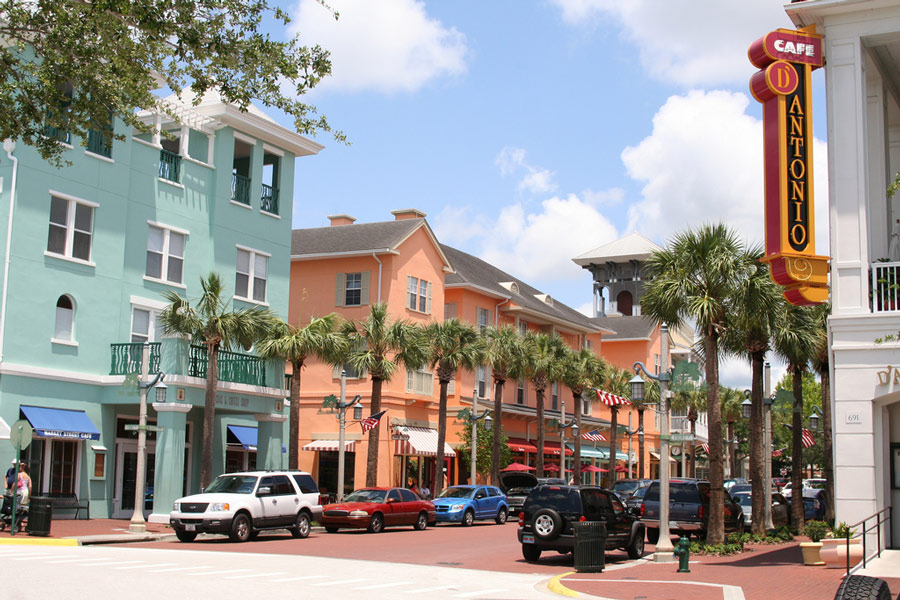
Celebration, FL ("ruined by mold and shoddy construction")
On the other hand, when a third of park patrons are nominal grown-ups we have to ponder the implications of an infantilized America. Psychologist Alison Gopnik says we're most childlike when consuming, or really consumed by, our fictions. The fantasy-industrial complex of our time now practically guarantees our perpetual prepubescence. Kids R Us, in the world of make-a-wish.
(Peter Singer, btw, has thoughts about the foundation of that name. Is it better to spend $7,500 on making a sick kid's wish to hang out with Batman or Scott Kelly come true, or to save several other from immanent starvation? Is that really such a hard call? Only in a Disneyfied land.)
And speaking of magical/wishful thinking, Rhonda Byrne's Secret counsel is to "be like a child, and make-believe... and watch the magic begin!" That's the faith of our "dominant religion" in the church of Get Yours Now (a spin-off of Flip Wilson's Church of What's Happenin' Now), the confident belief that wishing will make it so. Our popular music tells the tale: When you wish upon a star, I'm a believer, Oh oh oh it's magic, y'know... etc.
Children frequently do imbibe the faith and hit the jackpot here. America's Facebook fantasy made Mark Zuckerberg a billionaire at twenty-three, quicker than he could grasp the meaning or importance of privacy. Lots of Wall Streeters were (and are) Wunderkinds too, right up until they weren't. Too big to fail? Or too young to know the meaning of the word? Have social media and online life generally contributed to making it much too "easy to track people without their knowledge"? Or is the concept of privacy now just a quaint holdover from primitive yesteryear?
In American Philosophy: A Love Story, John Kaag and his close colleague made an unsettling discovery: the women were all in the attic, at the West Wind library. Even Lydia Maria Child, "first woman of the Republic," "grande dame of American transcendentalism," observed with barely concealed contempt for the blithely unaware sexism of her time that women had no choice but to be "self-reliant" in a world of benighted male chauvinists.
Hull House founder Jane Addams defeated Teddy Roosevelt and Thomas Edison in 1913, and won a Nobel Prize in 1931. I'll bet half of you never heard of her, or the Settlement House movement of which she is the most salient example. How is that possible? Well, she was in the attic.
The humane ideals of philosophers in the American tradition have stood too much in the shadow of over-intellectualizers who value the abstract ideas over concrete experience. Addams, inspired and supported by John Dewey, pushed back hard. "Philosophy recovers itself when it ceases to be the device for dealing with the problems of philosophers and becomes the method, cultivated by philosophers, for dealing with the problems of men." And women, John.
Agnes Hocking's Shady Hill School (pics) looks and sounds like fun, with its supra-rational exuberance and all. An old 60s protest poster complaining about "no poetry in your lectures."

Not a problem at Shady Hill, as poet/alum May Sarton corroborated. "The school was born of the marriage of poetry and philosophy, and though philosophy was worshipped, poetry ruled." (And here's a poem for today... The other day there was an even better one, by Billy Collins: I sometimes wonder about the thoughtful Roman/who came up with the notion/that any problem can be solved by walking... But it was a thoughtful Greek named Diogenes, Billy, who came up with it first.)
Ms. Sarton said, "We have to dare to be ourselves, however frightening or strange that self may prove to be." It's much easier to muster the courage of self-possession in a supportive educational environment committed to that very endeavor.

Children frequently do imbibe the faith and hit the jackpot here. America's Facebook fantasy made Mark Zuckerberg a billionaire at twenty-three, quicker than he could grasp the meaning or importance of privacy. Lots of Wall Streeters were (and are) Wunderkinds too, right up until they weren't. Too big to fail? Or too young to know the meaning of the word? Have social media and online life generally contributed to making it much too "easy to track people without their knowledge"? Or is the concept of privacy now just a quaint holdover from primitive yesteryear?
In American Philosophy: A Love Story, John Kaag and his close colleague made an unsettling discovery: the women were all in the attic, at the West Wind library. Even Lydia Maria Child, "first woman of the Republic," "grande dame of American transcendentalism," observed with barely concealed contempt for the blithely unaware sexism of her time that women had no choice but to be "self-reliant" in a world of benighted male chauvinists.
Hull House founder Jane Addams defeated Teddy Roosevelt and Thomas Edison in 1913, and won a Nobel Prize in 1931. I'll bet half of you never heard of her, or the Settlement House movement of which she is the most salient example. How is that possible? Well, she was in the attic.
The humane ideals of philosophers in the American tradition have stood too much in the shadow of over-intellectualizers who value the abstract ideas over concrete experience. Addams, inspired and supported by John Dewey, pushed back hard. "Philosophy recovers itself when it ceases to be the device for dealing with the problems of philosophers and becomes the method, cultivated by philosophers, for dealing with the problems of men." And women, John.
Agnes Hocking's Shady Hill School (pics) looks and sounds like fun, with its supra-rational exuberance and all. An old 60s protest poster complaining about "no poetry in your lectures."

Not a problem at Shady Hill, as poet/alum May Sarton corroborated. "The school was born of the marriage of poetry and philosophy, and though philosophy was worshipped, poetry ruled." (And here's a poem for today... The other day there was an even better one, by Billy Collins: I sometimes wonder about the thoughtful Roman/who came up with the notion/that any problem can be solved by walking... But it was a thoughtful Greek named Diogenes, Billy, who came up with it first.)
Ms. Sarton said, "We have to dare to be ourselves, however frightening or strange that self may prove to be." It's much easier to muster the courage of self-possession in a supportive educational environment committed to that very endeavor.
No comments:
Post a Comment